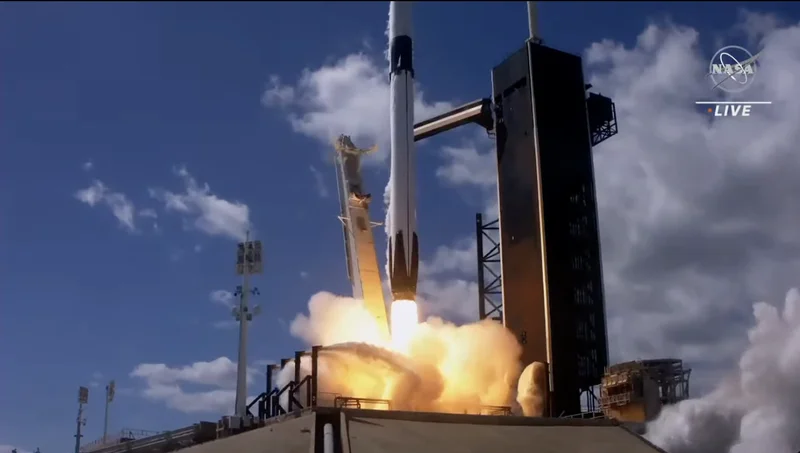Rocket Launch Today: What Happened and the Lingering Questions
Okay, everyone, buckle up. I know I say this a lot, but this week… this feels different. This isn’t just another series of launches; it’s a convergence. A moment where the stars – literally and figuratively – are aligning to give us a real glimpse of a future where space isn't just for governments and billionaires, but for us.
We've got Blue Origin gearing up for its second New Glenn launch, aiming to propel NASA’s ESCAPADE mission to Mars. We’ve got SpaceX, ever the workhorse, pushing for more Starlink deployments. And we’ve got… well, a bit of drama with new FAA restrictions throwing a wrench into launch schedules. But honestly? Even the drama is exciting because it shows just how rapidly things are changing. It's like watching a teenager grow – awkward, unpredictable, but undeniably heading somewhere amazing.
A Symphony of Ambition
Let’s break this down. Blue Origin’s New Glenn is a BEAST. Towering over 300 feet, it's right up there with the big boys like NASA's SLS and SpaceX's Starship. And this launch isn't just a test; it's carrying NASA's ESCAPADE mission. Twin spacecraft heading to Mars to study solar winds? This isn’t just about getting off Earth; it's about understanding the entire solar system. What if this mission unlocks new understandings of space weather, protecting our satellites and even, eventually, helping us shield future Martian colonies? I can’t help but feel a childlike sense of wonder.
And then there's SpaceX. Yeah, they had to scrub a launch due to weather. Bummer, right? But consider this: they were this close. Thirty seconds away from launching another batch of Starlink satellites. This relentless pace, this constant iteration, is what’s driving down the cost of access to space. And that's the key. The cheaper it gets, the more innovation we see. The more innovation, the faster we progress. Think of it like the printing press – once information became easier to distribute, the world changed. Are Starlink satellites today's printing press, spreading connectivity instead of knowledge?
But here’s where it gets really interesting. The FAA is dropping a new directive that restricts commercial launches to certain hours. Why? Details on why the decision was made remain scarce, but the impact is clear. Some are seeing this as a setback, a bureaucratic hurdle. I see it as growing pains. We're at a point where space activity is becoming so frequent, so normal, that we need to start thinking seriously about regulations, about airspace management. It’s a sign of maturity, even if it feels a little frustrating in the moment. Rocket Lab, for its part, seems unfazed, noting their New Zealand launches are unaffected. This is the kind of competition that drives innovation.

And even the "fireball" spotted over Florida before the scrubbed SpaceX launch… some thought it was space junk, a meteorite, who knows. But it reminds us that the sky above us is becoming a busier place, a new frontier filled with both opportunity and, yes, a little bit of risk. What new technologies will we need to track and manage all this activity? What new industries will emerge to support this burgeoning space economy? Fireball spotted in Florida sky as SpaceX attempts Falcon 9 rocket launch
One thing is for sure: the collective excitement is palpable. I saw a comment on a space-focused Reddit thread that perfectly captures it: "It feels like we're finally on the cusp of a true space age, not just a government-funded one." Exactly!
What this means for us is… but more importantly, what could it mean for you? Imagine a future where space tourism is as common as air travel. Where asteroid mining provides us with the resources to solve Earth's energy crisis. Where lunar colonies become a stepping stone to interstellar travel. It sounds like science fiction, I know. But these launches, these technologies, these regulations… they're all pieces of the puzzle.
Of course, with this incredible power comes incredible responsibility. We need to think about the ethical implications of space exploration, about protecting the space environment, about ensuring that the benefits of space technology are shared by all of humanity. It's easy to get caught up in the excitement of it all, but we can't afford to be naive.
The Dawn of a New Horizon
This week isn't just about rockets and satellites. It's about potential. It's about the human spirit, our insatiable curiosity, our relentless drive to explore. It's about a future where the sky is no longer the limit, where the entire universe is within our reach. When I look at everything happening, I honestly just sit back in my chair, speechless. This is the kind of breakthrough that reminds me why I got into this field in the first place.
-

The Juan Gabriel 'Alive' Hoax: Deconstructing the Latest 'Proof'
So,JuanGabrielisaliveagain.I...
-

Jeff Bezos: His Net Worth, His Love Life, and Why We're All Obsessed
So,JeffBezoshasdescendedfrom...
-

Zcash's Sudden Price Surge: Analyzing the Catalysts and Its Future Outlook
Zcash'sViolentRally:Deconstruct...
-

Warren Buffett's OXY Stock Play: The Latest Drama, Buffett's Angle, and Why You Shouldn't Believe the Hype
Solet'sgetthisstraight.Occide...
-

Registered Investment Advisor (RIA): Defining the Role, Services, and Fee Structures
TheQuietRuleChangeThatWillRe...
- Search
- Recently Published
-
- Cidara Therapeutics: Stock, News, & The Usual Spin?
- ANyONe Protocol: What the hell is it, and is it even real?
- BMO: The Bank, The Stadium, The Cartoon, and Why You Should Care
- BBAI Stock: The Investment Case vs. The Current Data
- CoreWeave's Stock Nosedive: What They're Not Telling You
- IRS Relief Payment: Status, Timing, and What the Data Shows
- Zcash's "Historic Surge": Hayes is Hyping It?
- BMO: What is it and Where Can I Find One?
- Avelo Airlines: FAA Cuts and the Lakeland Linder Opportunity
- SpaceX Launch Today: What Happened and Launch Time Details
- Tag list
-
- carbon trading (2)
- Blockchain (11)
- Decentralization (5)
- Smart Contracts (4)
- Cryptocurrency (26)
- DeFi (5)
- Bitcoin (29)
- Trump (5)
- Ethereum (8)
- Pudgy Penguins (5)
- NFT (5)
- Solana (5)
- cryptocurrency (6)
- XRP (3)
- Airdrop (3)
- MicroStrategy (3)
- Stablecoin (3)
- Digital Assets (3)
- PENGU (3)
- Plasma (5)
- Zcash (6)
- Aster (4)
- investment advisor (4)
- crypto exchange binance (3)
- SX Network (3)
